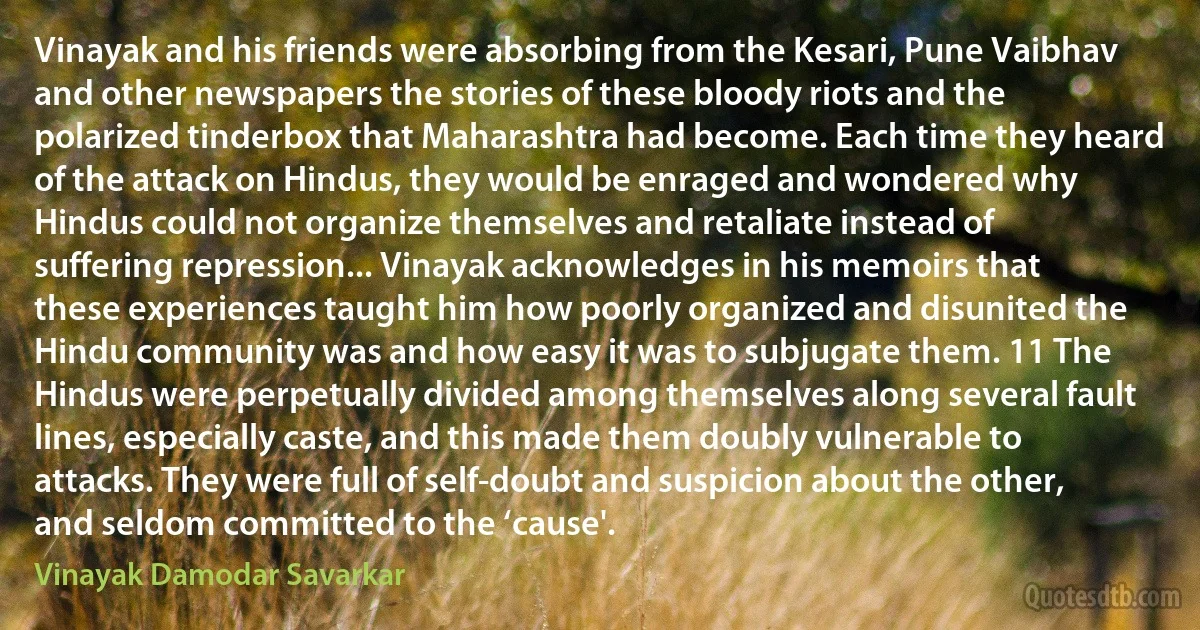
Vinayak and his friends were absorbing from the Kesari, Pune Vaibhav and other newspapers the stories of these bloody riots and the polarized tinderbox that Maharashtra had become. Each time they heard of the attack on Hindus, they would be enraged and wondered why Hindus could not organize themselves and retaliate instead of suffering repression... Vinayak acknowledges in his memoirs that these experiences taught him how poorly organized and disunited the Hindu community was and how easy it was to subjugate them. 11 The Hindus were perpetually divided among themselves along several fault lines, especially caste, and this made them doubly vulnerable to attacks. They were full of self-doubt and suspicion about the other, and seldom committed to the ‘cause'.
Vinayak Damodar SavarkarRelated topics
attack cause commit easy fault full hindu memoirs repression suffering suspicion teach time Friends Maharashtra self-doubtRelated quotes
People ask me, "Do you have optimism about the world, about how terrible it is?" And I say, "Yes, it's great the way it is" ... I had the wonderful privilege of sitting face to face with [a Hindu guru] and the first thing he said to me was "Do you have a question?", cause the teacher always answers questions... I said, "Yes, I have a question." I said, " Since in Hindu thinking all the universe is divine, a manifestation of divinity itself, how can we say no to anything in the world? How can we say no to brutality to stupidity to vulgarity to thoughtlessness?" And he said, "For you and me, you must say yes." Well, I learned from my friends who were students of his that that happened to be the first question he asked his guru, and we had a wonderful conversation for an hour there.

Joseph Campbell
If I had power and could legislate, I should certainly stop all proselytising. It is the cause of much avoidable conflict between classes and unnecessary heart-burning among the missionaries... In Hindu households the advent of a missionary has meant the disruption of the family coming in the wake of change of dress, manners, language, food and drink. ... The other day a missionary descended on a famine area with money in his pocket, distributed it among the famine-stricken, converted them to his fold, took charge of their temple and demolished it. This is outrageous. The temple could not belong to the converted, and it could not belong to the Christian missionary. But this friend goes and gets it demolished at the hands of the very men who only a little while ago believed that God was there.

Mahatma Gandhi
The main point is, did God tell him to make a boat, or did Noah just use his captain common sense? Cause there are a number of us, if we were somewhere where it was raining and raining and raining and raining and raining and raining and raining and raining, and we had a big pile of wood, some of us might put two and two together and go, "I'm gonna make a bloody boat!" Others might go, "I'm gonna make a hairdresser's", "I'm gonna build a monkey emporium.", "I'm gonna build a big pair of wooden shoes, that would fit a giant." ... But he made a boat. Oh, he was quite sensible! And what did he put on the boat? His family. What else? Animals. Which animals? Any he could find. Did he put two of every animal in the world on the boat? No! How can I be so sure? Try it!

Eddie Izzard
.. you [Otto] know me well enough to know that I am not bad and heartless. It just happen to be a 'Sturm und Drang' period which I have to get through, and there is no way to avoid hurting the people closest to me. It hurts me to cause you all this pain and suffering. Believe me when I say it is not easy for me either. But I must fight it through, to one exit or another – It has begun to be really beautiful here... I've seen wonderful Courbet's. I am sorry that he is now the latest mode. I think he is greater than either Manet or Monet. There was a colossal still life [of Courbet] with hollyhocks, in every conceivable colour, with a female figure in it. It was magnificently painted... Stay close to Elsbeth and to your art..

Paula Modersohn-Becker
Some professor of history wrote that cultures define their gods when they're young and primitive, when their main concern is survival. They endow their gods with survival characteristics like omnipotence and authoritarianism, belligerence and suspicion, and that's what goes into all their myths or scriptures. Then, if they survive long enough, they begin to develop morality. They examine their own history, and they learn that authoritarianism doesn't accord with free will, that belligerence and suspicion are unhealthful, but this newly moral culture is stuck with its bigoted, interfering gods, plus it's stuck with people who prefer the old bloody gods and use them as their justification for doing all kinds of awful things.

Sheri S. Tepper
